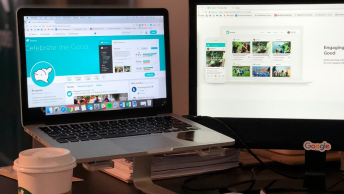On June 25th, 2017, we saw a few fluctuations on the SERPs for various categories on SEMrush. Based on the facts by industry leaders, it becomes necessary for the SEOs like us to ensure our websites do not get affected by the Google updates. Here are the ways we can prepare ourselves, if we have not yet been, for the coming Google SEO updates.
Google loves to be in the news!
Well, I can say that as Google has been consistent with its updates every year: the RankBrain update in 2016 and when Google rolled out an update titled Fred in March 2017.

It was June 25th, 2017 when it all started again. Also, I am not sure whether this update can also be called Fred.
I noticed a few fluctuations on my SEMrush account. And, people started discussing the same over Twitter like below:

Then, I saw Barry Schwartz talking about a Google Algorithm Update takeoff.
But, as we see, John Mueller from Google, replied on those doubts, calling it “just random chatter.”

Looking at the fluctuations on SEMrush, here are a couple of things we SEOs need to be more conscious about:
1. Jump On Mobile-First Index
When we saw some chatter about the update, people started looking into their tools to confirm the fluctuations in their industry and ranks.
Also, if I see the fluctuations for all the categories on desktop, the following is the summary from SEMrush:

Here is what I have now for all the categories on Mobile search from SEMrush:

In the above images, we can see the volatility starts from June 20th, 2017. A sudden up and a fall that remains constant for all categories on mobile search compared to Desktop queries. This means that Google is likely shuffling the SERP as per its mobile-first index.

Recommendations by Google for Mobile-First Index
Thus, it is crucial for us to take the recommendations of mobile-first index offered by Google. If we do these updates seriously, we will remain unaffected by the upcoming updates.
2. Optimize Content For RankBrain
What is RankBrain?
Many sites discuss what RankBrain is. For an excellent synopsis of this subject check out these resources:
- FAQ: All About The Google RankBrain Algorithm by Search Engine Land
- What Is Google RankBrain And Why Does It Matter? by Forbes
- Understanding Google RankBrain Algorithm by Search Engine Journal
Now, an AI system is only going to check your website for genuineness. So, it is vital for us to ensure we optimize our website for RankBrain. And, for this, there are some fantastic points to write SEO content that impresses Google’s RankBrain by Mattan Danino:
• Choose phrases, not simple keywords
• Use Google’s planning tools for keyword research
• Write naturally, yet strategically
• Choose mobile optimization (As we discussed above)
• Write informative and intuitive content (we hear a lot about this so don’t ever miss out on this)
3. Work More on Titles & Meta Descriptions
Well, I love this portion because I change my titles and meta descriptions frequently and see great results from this strategy.
Also, RankRanger came up with interesting facts about fluctuations seen across various industries from Food & Drink, Travel, Health & Fitness, and many others during Google’s June update. The following picture is Rank Ranger’s summary:

Based on the facts that they have gathered in their post, it shows that the listings from Rank 6 to 10 has seen significant fluctuations.
This creates another discussion on following the best practices for creating website’s titles & meta descriptions as well.
On this, Moz has listed great best practices for each of them and here are a few of those practices:
For Titles
• Watch your title length
• Don’t overdo SEO keywords
• Give every page a unique title
• Put important keywords first
• Take advantage of your brand
• Write for your customers
See more tips from Moz about perfecting title tags.
For Meta Descriptions
• Write compelling ad copy
• Avoid duplicate meta description tags
• Don’t include double quotation marks
• Sometimes, it’s okay to not write meta descriptions
See more tips from Moz about perfecting meta descriptions.
Also, there are various tools for creating them, but, I use SEOmofo Snippet Optimization Tool:

4. Be Very Careful Around Link Building
Google recommends not to focus explicitly on link building as it can harm your website rather doing any good to it. Here is a video from Google’s John Mueller explaining link building:
Also, to understand what kind of link building techniques can harm your website, here is a list by Google Webmaster Console.
Now, ensure you do learn how to do link building the right way by using this excellent guide from Backlinko.
SEE ALSO: Link Building vs Link Earning. Which Is Best?
5. Always Look for Penalties
It is always advisable to check if your website has been penalized by Google. This check becomes mandatory when your rankings seem to be going down. Here are a couple of ways that you can always use to find out whether your website has been penalized by Google.

Also, what you can do is, log into your SEMrush account and check for penalization.
How to overcome the Penalties?
There’s a detailed list on how to overcome the penalties by Moz. But, in that article what I liked the most is the tips on removing links if they are not adding to your search ranking. Here is its snapshot:

Thus, I would suggest that you be very careful while building links. It is better to earn links instead.
In Conclusion
The moral of the story behind Google’s latest algorithm update on June 25th, 2017 is that it’s a wake-up call for all the SEOs not focusing on the guidelines offered by Google. To make the biggest SEO impact, you have to keep up with the times and keep educating yourself on Google’s best practices.
What did you notice during these June SERP fluctuations? Did you see any other indication from Google? Please share with me in the comment section below as it will help me and all other SEOs with our search engine optimization.










